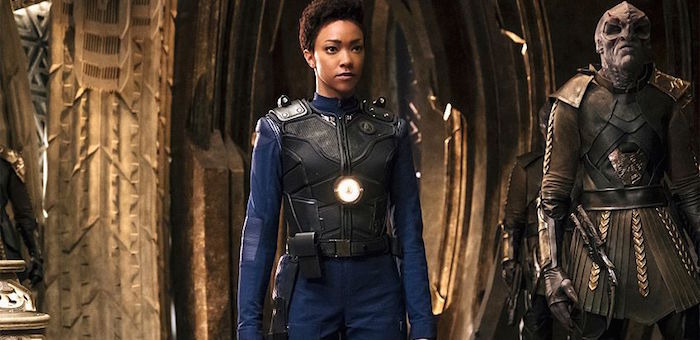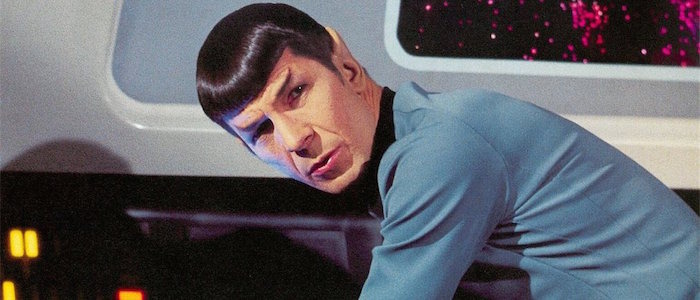'Star Trek: Discovery' Season 2 Bringing In Spock Represents A Huge Opportunity For The Series
Star Trek: Discovery won't be back in orbit on CBS All-Access until 2019, but the second season has already made news by casting Spock. Ethan Peck is going to portray the character in his earlier years and will, of course, help his sister Michael Burnham (Sonequa Martin-Green), their father Sarek (James Frain) and the Discovery crew figure out what's going on with the U.S.S. Enterprise.
"We searched for months for an actor who would, like [Leonard Nimoy and Zachary Quinto] bring his own interpretation to the role. An actor who would, like them, effortlessly embody Spock's greatest qualities, beyond obvious logic: empathy, intuition, compassion, confusion, and yearning," said executive producer Alex Kurtzman, according to Variety. "Ethan Peck walked into the room inhabiting all of these qualities, aware of his daunting responsibility to Leonard, Zack, and the fans, and ready to confront the challenge in service of protecting and expanding on Spock's legacy. In that spirit, we're thrilled to welcome him to the family."
I'm so excited for Peck's turn as Spock. I think, just as the character has done in the past, he will positively affect the viewers and how they feel about race relations, xenophobia, and honoring others' humanity. In fact, I think the combination of both Spock and Michael allows the show the potential to dive deep into some very serious allegories for the types of issues biracial/multiracial people and transracial adoptees face when it comes to recognizing and owning their identities.
Michael’s transracial adoptee journey
One of the elements of Michael's personal journey that has been hinted at is her inability to completely gain acceptance in Vulcan's xenophobic culture – her adopted culture refuses to accept her because she is a human. However, for us in the 21st century, where race unfortunately still matters, the subtext is that Michael represents those who aren't accepted due to their racial background.
The societal baggage and stereotypes she faced with her Vulcan contemporaries, of being thought of as either less than others because of her background or an exception to the rule, are the same types of things people of color experience in American society. It might sound like a cliche to write the saying "work twice as hard for half the recognition," but the saying is true. It's something I've had to contend with in my life, and it's definitely something Michael had to struggle with on Vulcan. Remember: even though she excelled as the first human to enter the Vulcan Science Academy, she couldn't join the Vulcan Expeditionary Group because of the organization's racism, despite being highly qualified and having societal clout due to her adopted father Sarek, a Vulcan dignitary.
Michael's experience of being a human raised in a Vulcan household could also be analogous to transracial adoptees – children who are adopted into families opposite their race. Even though Michael remembers her parents, she identifies as a Vulcan and has done all she could to assimilate into Vulcan culture, at the expense of suppressing her human qualities. However, she's constantly reminded by Vulcan xenophobes and terrorists (who tried to kill her as a child) that she's different. Similarly, many transracial adoptees grow up identifying with their adopted parents' race while constantly being told by others that they're different. This was explored in a 2015 article by The Root, which highlighted the experiences black transracial adoptees have had after assimilating into – and then unlearning – whiteness as taught to them by their white families.
"One of the interesting things from when I was younger is when you grow up with white parents, white neighborhood, white church, your default identity is a white kid. Blackness comes later," said Chad Goller-Sojourner, a black man who was raised by a white family. "People always reminded me I was black."
"As an adult adoptee, [I] have no connection," said LisaMarie Rollins. "I grew up in an all-white community, all-white Christian evangelical school. The notion of my blackness was simultaneously erased, yet everyone is projecting their ideas of blackness on me."
Indeed, Michael's own journey showcases how she had to unpack and unlearn the notion of "Vulcanness" in order to full embrace her humanness. I hope that her journey towards self-realization continues and that Spock is a big part of that journey. Hopefully, the journey also allows us to see a glimpse into the man we know he will become.
Spock’s biracial experience
Spock's own issues with Vulcan society overlap Michael's. Michael's problems might be seen as more acute, since she is a full-blooded human trying to integrate into Vulcan's racially-homogenous culture. But Spock's problems are just as difficult to navigate, if not more so, since he's half Vulcan, half human, and must walk the path of feeling like he's not enough for either side.
From what I've read about how Spock has been received by biracial and multiracial Trek fans, it's clear that the character touches on the unique experience of having your identity be shared by two or more races and/or cultures. That might be the most pronounced in a response Leonard Nimoy wrote to a young biracial girl who wanted to know how Spock handled being bullied for being biracial.
"As you may know, only Spock's mother was human. His father was a Vulcan. Spock grew up among Vulcan children and, because he was different, he had to face the problem of not being accepted. This is because people, especially young people it seems, and Vulcans, too, tend to form into groups," he wrote. "...They often demand that you be just like them or you will not be accepted. And the Vulcans were no different than humans when it comes to prejudice...Spock learned he could save himself from letting prejudice get him down. He could do this by really understanding himself and knowing his own value as a person. He found he was equal to anyone who might try to put him down – equal in his own unique way. You can do this too, if you realize the difference between popularity and true greatness. It has been said that 'popularity' is merely the crumbs of greatness."
I've always thought about this letter and how it shows just how much Star Trek speaks to people, particularly the marginalized who don't see their stories related on screen. It's my hope, then, that the Discovery writers thought about this letter and how Spock isn't just a stoic half-alien who is second in command to Captain Kirk. To me, Spock has been the heart of Star Trek, since he embodies all of the ideals the show aspired to reach. Aside from Uhura and Sulu, Spock is character who broadened the conversation about race and race relations to the masses. Specifically, Spock opened up the conversation of how we as a country relate to those who are racially and culturally multifaceted.
At the risk of me sounding like I'm writing the series, I have a theory about how Spock's evolution throughout this season might go. Even though Spock will be feeling the pressure from Vulcans about being half-human, Spock might console himself by thinking that he's better than Michael because at least he's half, while his sister isn't even Vulcan at all. If that's the case, then maybe Spock's journey could also highlight another racialized practice in America – passing.
Technically, Michael is guilty of passing, too, since she's formed her entire identity around fitting in. But in Spock's case, passing is something he might view as a comfort blanket of sorts; whereas Michael doesn't look Vulcan, Spock does. He can successfully go throughout Vulcan society and not get as much BS as Michael might. In that way, he has an advantage. However, that advantage costs a price; Spock must denounce his human side in order to participate.
Similarly, racial passing provides an "advantage" with diminishing returns. It creates undue psychological stress, forgetting one half of your person while exalting the other half, all to fit in. Gail Lukasik, for example, wrote an op-ed in the Washington Post about discovering her mother passed for white and had to endure racism from her white friends and her own husband, none of whom knew she had an African-American background.
"Piecing her life together, I marveled at how she endured the racism of living in the predominately white suburb of Parma, Ohio, with a racist husband," wrote Lukasik. "My father's racism was a reflection of his upbringing in a close-knit Cleveland ethnic neighborhood. Though he never used the N-word, he was still vocal about his bigotry, referring to African Americans using other racial slurs, deriding blacks for what he perceived as their lack of ambition and criminality. Unknowingly deriding his wife, my mother."
Her mother's secret kept Lukasik from meeting family members in New Orleans, who might not have been able to pass for white. The secret also made Lukasik's mother ask her to never bring up her ancestry while she was alive.
"'Promise me,' she pleaded, 'you won't tell anyone until after I die. How will I hold my head up with my friends?'" wrote Lukasik. Perhaps Star Trek: Discovery wouldn't be as dramatic as this real life story, but I could imagine Spock feeling some of the same anxiety about the possibility of simply passing to get by, even if it means affecting his relationship with himself.
I think it could be eye-opening to see a young Spock wrestle with some of the same issues. At this point in his life, he might not have the self-confidence to assert himself fully. Just like Michael was at the beginning of Discovery, Spock might feel compelled to appear and act more stereotypically "Vulcan" to fit in. Spock might even be more self-conscious and insecure because of his parents and what he might feel is his precarious position in society. I hope the show decides to give Michael and Spock a lot of those moments together in which they confide in each other and help each other figure themselves out.
I know whatever the Star Trek: Discovery writing team has in store for us regarding Spock and Michael will be entertaining and thought-provoking. I hope that in their efforts to make us think about our current society, they also use these characters as sounding boards for how we need to elevate our thinking when it comes to those who don't fit neatly in racial boxes. At this point in society, it makes sense for us to start looking outside of the narrow confines of the racial construct and realize that that's all it actually is – a construct.


